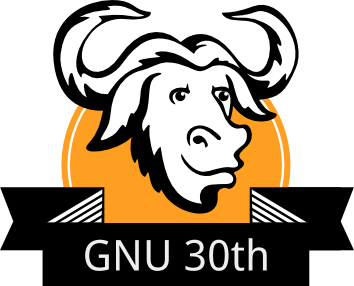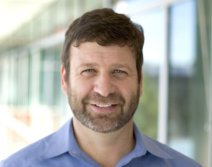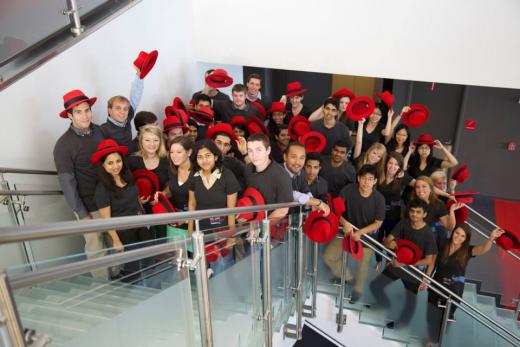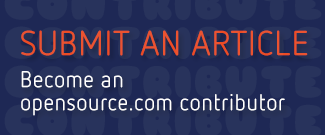Free Software Supporter
Issue 65, August 2013
Welcome to the Free Software Supporter, the Free Software Foundation's monthly news digest and action update -- being read by you and 69,626 other activists.
Encourage your friends to subscribe and help us build an audience by adding our subscriber widget to your web site.
#
TABLE OF CONTENTS
You're Invited: GNU 30th anniversary celebration and hackathonUnited for a Web without proprietary JavaScriptReplace your LibrePlanet2012 shirt for only $10!GNU MediaGoblin shirts now availableFirst batch of videos from LibrePlanet 2013 published!gNewSense 3.0 releasedFSF to begin accepting GPG signed assignments from the U.S.Interview with Bernd Kreuss of TorChatNew fsfstatus notification accountSell your Netflix stock to send a message: No DRM in HTMLRMS in Passo Fundo, Rio Grande do Sul, BrazilRMS in Berlin, Germany, for induction into the Internet Hall of FameReplicant project opens forumsConservancy helps Samsung resolve GPL compliance matter amicablyConservancy seeks Systems Analyst / Software Architect for six-month consulting positionUse Libre.fm and GNU FM and help defeat surveillanceParanoia optimization for our modern timesLeastAuthority.com announces a spy-proof storage serviceJoin the FSF and friends in updating the Free Software DirectoryLibrePlanet featured resource: GNU 30th anniversary satellite eventsGNU Spotlight with Karl Berry: 15 new GNU releases!GNU Toolchain UpdateRichard Stallman's speaking schedule and other FSF eventsThank GNUs!Take action with the FSF!
You're Invited: GNU 30th anniversary celebration and hackathon
From August 26th
The GNU system will be celebrating its 30th anniversary on September 28 and 29 in Boston, and in cities around the world. RSVP today.
United for a Web without proprietary JavaScript
From August 30th
The FSF has launched a campaign to persuade organizations to make their Web sites work without requiring that users run any nonfree JavaScript. Users are uniting to focus on one site at a time -- currently, greenpeace.org.
Replace your LibrePlanet2012 shirt for only $10!
From August 1st
Relive the fond memories of LibrePlanet with logo shirts commemorating the events in 2012 and 2013.
GNU MediaGoblin shirts now available
From August 30th
GNU MediaGoblin shirts are now available in the GNU Press store for $25 and are printed on American Apparel t-shirts.
First batch of videos from LibrePlanet 2013 published!
From August 7th
The first batch of videos from LibrePlanet 2013 are now available for streaming and downloading in VP8/Vorbis, both free media formats, and are hosted on an instance of GNU MediaGoblin.
gNewSense 3.0 released
The latest release of gNewSense is out, bringing with it a spate of new features and bug fixes. Most notably, gNewSense 3.0, codenamed "Parkes," is now based on Debian rather than Ubuntu.
FSF to begin accepting GPG signed assignments from the U.S.
The FSF is pleased to announce that we can begin accepting GPG-signed assignments from contributors residing in the United States.
Interview with Bernd Kreuss of TorChat
From August 27th
This is the latest installment of our Licensing and Compliance Lab's series on free software developers who choose GNU licenses for their works. In this edition, we interviewed Bernd Kreuss, the developer of TorChat, a peer-to-peer instant messenger with a completely decentralized design.
New fsfstatus notification account
From August 28th
The FSF has a new out-of-band notification account at
https://pumprock.net/fsfstatus. We will post updates on planned and unplanned service outages there.
Sell your Netflix stock to send a message: No DRM in HTML
From August 28th
We're ramping up the pressure on Netflix to keep DRM away from the HTML standard and asking investors to sell their shares in NFLX.
RMS in Passo Fundo, Rio Grande do Sul, Brazil
RMS was in the Centro de Eventos of the Universidad de Passo Fundo, in Passo Fundo, Rio Grande do Sul, Brazil, on July 1st, 2013, to deliver his speech "A Free Digital Society," to an audience of over four hundred professionals, students, and teachers in the IT field.
RMS in Berlin, Germany, for induction into the Internet Hall of Fame
On August 3rd, 2013, RMS was at the InterContinental Hotel, in Berlin, Germany, where he was inducted in the Internet Hall of Fame, in recognition of his contributions as an innovator and for founding the Free Software Foundation.
Replicant project opens forums
By Paul Kocialkowski, from August 9th
The Replicant project has opened forums to encourage community support and discussion.
Conservancy helps Samsung resolve GPL compliance matter amicably
By Software Freedom Conservancy, from August 16th
Samsung and Conservancy worked together to resolve an issue where a GPLed exFAT filesystem driver was released without the complete corresponding source code.
Conservancy seeks Systems Analyst / Software Architect for six-month consulting position
By Software Freedom Conservancy, from August 26th
Conservancy recently raised funds to begin work on an FSF-endorsed free software non-profit accounting system and now seeks the talent of an experienced systems analyst and software designer to complete a six-month contract project (with the possibility of extension).
Use Libre.fm and GNU FM and help defeat surveillance
By Libre.fm, from August 26th
The Libre.fm and GNU FM developers outline the importance of using free software to combat surveillance and add that with the 30th anniversary of the GNU project coming in September, now is an important time for all GNU projects to work together on providing replacements to sites that users cannot control.
Paranoia optimization for our modern times
By Deborah Nicholson, from August 23rd
GNU MediaGoblin contributer Deborah Nicholson reflects on the social effects of avoiding surveillance on the Web.
LeastAuthority.com announces a spy-proof storage service
By LeastAuthority.com, from July 30th
LeastAuthority.com has announced Simple Secure Storage Service (S4), a backup service that encrypts your files to protect them from the prying eyes of spies and criminals.
Join the FSF and friends in updating the Free Software Directory
From August 30th
Tens of thousands of people visit directory.fsf.org each month to discover free software. Each entry in the Directory contains a wealth of useful information, from basic category and descriptions to version control, IRC channels, documentation, and licensing. The Free Software Directory has been a great resource to software users over the past decade, but it needs your help staying up-to-date with new and exciting free software projects.
To help, join our weekly IRC meetings on Fridays. Meetings take place in the #fsf channel on irc.gnu.org, and usually include a handful of regulars as well as newcomers. Everyone's welcome.
The next meeting is Friday, September 6th from 2pm to 5pm EDT (18:00 to 21:00 UTC). Details here:
LibrePlanet featured resource: GNU 30th anniversary satellite events
Every month on LibrePlanet, we highlight one resource that is interesting and useful -- often one that could use your help.
For this month, we are highlighting the list of GNU 30th anniversary satellite events, which provides information about celebrations for the GNU system's 30th anniversary occurring around the world. You are invited to adopt, spread and improve this important resource.
Do you have a suggestion for next month's featured resource? Let us know at
campaigns@fsf.org.
GNU Spotlight with Karl Berry: 15 new GNU releases!
15 new GNU releases this month (as of August 26, 2013):
bison-3.0bzr-2.60combine-0.4.0denemo-1.0.6freeipmi-1.3.1gettext-0.18.3.1glibc-2.18glpk-4.52.1gnubatch-1.9gnupg-2.0.21libmatheval-1.1.11parallel-20130822sipwitch-1.7.0ucommon-6.0.7xorriso-1.3.2
As always, please feel free to write to me,
karl@gnu.org, with any GNUish questions or suggestions for future installments.
GNU Toolchain update
From August 19th
The GNU toolchain refers to the part of the GNU system which is used for building programs. These components of GNU are together often on other systems and for compiling programs for other platforms.
Read about updates to G++, GCC, and more.
Richard Stallman's speaking schedule
So far, Richard Stallman has the following events in September:
Aug 31, 2013 12:30 PM, Johannesburg, Pretoria,
"A free digital society"Sep 03, 2013 2:00 PM, Pretoria, South Africa,
"Free software: defending your freedom"Sep 05, 2013 6:00 PM, Cape Town, South Africa,
"A free digital society"Sep 06, 2013 5:00 PM, Durban, South Africa,
"The danger of software patents"Sep 19, 2013 5:00 PM, Biot, France,
"A free digital society"Sep 20, 2013 6:00 PM, Paris, France,
"A free digital society"
Other FSF and free software events
Sep 21, 2013 09:30 AM to 05:30 PM, Cambridge, MA,
Software Freedom Day - CambridgeSep 27, 2013 12:00 AM to 11:55 PM, Worldwide,
Happy 30th Birthday, GNU!Sep 28, 2013 10:00 AM to Sep 29, 2013 5:00 PM, Cambridge, MA,
GNU 30th Anniversary Celebration and Hackathon
Thank GNUs!
We appreciate everyone who donates to the Free Software Foundation, but we'd like to give special recognition to the folks who have donated $500 or more in the last month.
This month, a big Thank GNU to:
Gregory MaxwellKevin McCarthyColin CarrSteve SprangMartin CohnKrishna KunchithapadamLiang ZhaoBitcoin GrantChris AllegrettaEberhard SchopfHenri Sivonen
Take action with the FSF
Contributions from thousands of individual members enable the FSF's work. You can contribute by joining at
https://www.fsf.org/join. If you're already a member, you can help refer new members (and earn some rewards) by adding a line with your member number to your email signature like:
The FSF is also always looking for volunteers (
https://www.fsf.org/volunteer). From rabble-rousing to hacking, from issue coordination to envelope stuffing -- there's something here for everybody to do. Also, head over to our campaign section (
https://www.fsf.org/campaigns) and take action on software patents, DRM, free software adoption, OpenDocument, RIAA and more.
#
Copyright © 2013 Free Software Foundation, Inc.












